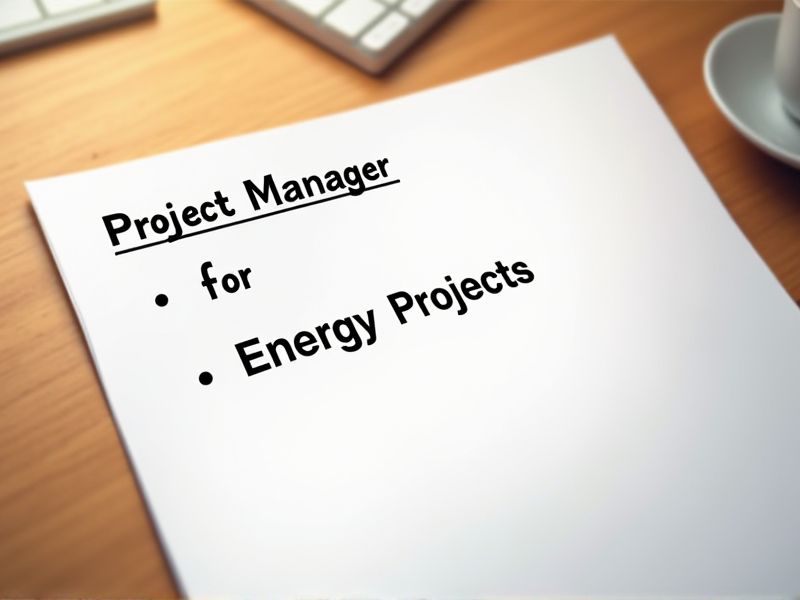
Project Managers in energy projects face complex challenges, including regulatory compliance, safety protocols, and environmental considerations. Certain certifications provide the necessary expertise to effectively navigate these complexities, ensuring projects meet all industry standards. These credentials also enhance a manager's credibility and demonstrate a commitment to maintaining best practices in an evolving sector. Here are essential certifications that a Project Manager in energy projects might require.
Project Management Professional (PMP)
Energy projects often involve complex components and high-risk factors. A Project Management Professional (PMP) certification enhances a project manager's capability to handle these intricacies by providing standardized methodologies and best practices. This leads to more efficient project execution, reduced financial risks, and improved safety measures. Organizations in the energy sector increasingly prefer PMP-certified professionals to ensure adherence to industry standards and successful project outcomes.
Certified Associate in Project Management (CAPM)
Possessing a Certified Associate in Project Management (CAPM) credential equips a project manager with standardized project management knowledge that aligns with global best practices, enhancing their ability to manage complex energy projects more effectively. The CAPM certification provides the foundational understanding required to tackle unique challenges in the energy sector, such as regulatory compliance and resource allocation. Employers in the energy industry often seek project managers with CAPM certification as it signifies a commitment to professional growth and a validated skill set. With the CAPM, project managers can more confidently lead teams, ensuring that energy projects are delivered on time, within scope, and on budget.
PMI Agile Certified Practitioner (PMI-ACP)
The PMI Agile Certified Practitioner (PMI-ACP) credential equips project managers in the energy sector with agile methodologies, crucial for adapting to rapidly changing project requirements. Agile practices enhance team collaboration and flexibility, crucial factors when dealing with the complexities and uncertainties inherent in energy projects. The certification demonstrates a project manager's ability to integrate agile techniques, fostering innovation and efficiency in sustainable energy initiatives. Earning a PMI-ACP credential signals a commitment to continuous improvement and up-to-date practices, valuable in an industry that is under constant pressure to evolve with renewable energy trends.
Certified Energy Manager (CEM)
A Certified Energy Manager (CEM) provides specialized knowledge crucial for optimizing energy efficiency, vital for successful project management in energy projects. Having a CEM ensures a comprehensive understanding of energy consumption patterns, which aids in more accurate planning and cost estimation. Energy projects often involve complex systems and regulations; a CEM brings the expertise to navigate these effectively. With their proficiency, CEMs can implement sustainable practices that meet regulatory standards, enhancing project credibility and success.
Renewable Energy Professional (REP)
Renewable Energy Professionals (REPs) bring specialized knowledge and expertise that can significantly enhance a Project Manager's understanding of sustainable energy technologies and best practices. This expertise is crucial as it helps identify the most efficient and effective renewable solutions, ensuring project viability and alignment with environmental goals. Their insights into regulatory frameworks and incentive structures can facilitate smoother project execution and compliance. Involving REPs can be pivotal in risk management, as they help navigate technical challenges and evolving industry standards in renewable energy projects.
PRINCE2 Practitioner
PRINCE2 Practitioner certification equips project managers with a structured project management framework that is crucial for efficiently navigating the complex regulatory environment of energy projects. Since energy projects often involve multiple stakeholders and intricate coordination, having a project manager with PRINCE2 expertise ensures effective communication and stakeholder management. The certification emphasizes adaptability, which is vital in energy projects due to changing technologies and regulatory requirements. PRINCE2's focus on risk management is particularly beneficial for energy projects, as they are prone to high levels of uncertainty and financial investment.
LEED Accredited Professional (LEED AP)
Having a LEED Accredited Professional (LEED AP) as a project manager ensures compliance with green building standards, enhancing sustainability efforts. This designation provides expertise in identifying energy-efficient solutions, reducing operational costs. LEED APs possess detailed knowledge of sustainable practices that often leads to higher project ratings and better environmental outcomes. Their involvement often results in attracting clients seeking eco-friendly and certified projects, giving a competitive edge in the market.
Lean Six Sigma Green Belt Certification
Lean Six Sigma Green Belt Certification equips project managers with tools to optimize processes, critical for energy projects that require high efficiency. By minimizing waste and improving quality, project managers can ensure resource conservation, crucial in energy sectors. This certification enhances analytical skills, important for tackling the complex variables and metrics in energy projects. Possessing a Green Belt fosters leadership abilities, essential for coordinating cross-functional teams in large-scale energy initiatives.
Energy Risk Professional (ERP)
Energy Risk Professionals (ERPs) possess specialized knowledge, providing essential insights to project managers about potential financial and regulatory risks in energy projects. Mitigating such risks ensures smoother project execution and financial stability, reducing the likelihood of unanticipated losses. Their expertise in assessing market volatility and regulatory changes assists project managers in making informed decisions, enhancing project resilience. The inclusion of an ERP in project management teams leads to better alignment with strategic objectives, improving project outcomes.
Professional Engineer (PE)
A Professional Engineer (PE) ensures that energy projects comply with industry standards and regulations, minimizing legal risks. The technical expertise provided by a PE enhances the accuracy and feasibility of engineering designs, thus ensuring project sustainability and efficiency. In terms of safety, a PE evaluates potential hazards and implements measures to safeguard both workers and infrastructure. Moreover, the PE credential builds trust with stakeholders, increasing the credibility of project proposals and facilitating smoother project approvals.
Summary
You gain a competitive edge in the job market with certifications in energy project management. Certifications can enhance your knowledge and skills, making you more adept at handling complex energy projects. Employers are likely to see you as more credible, increasing your chances of career advancement. Consequently, projects under your leadership may experience improved efficiency and better alignment with industry standards.
